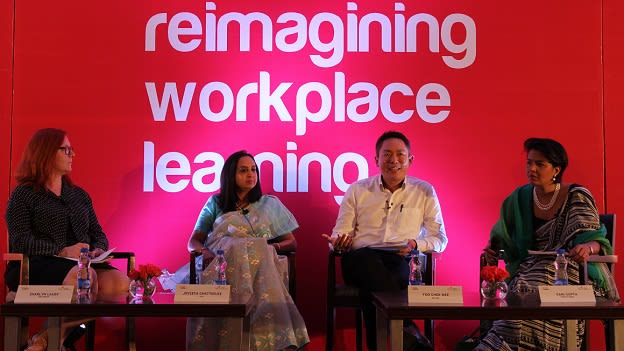Consumerization: Multigenerational Learners, Learners as Consumers

In the context of increasing digitization, consumerization and customization of learning interventions, the future of learning will be pertinent on allowing corporate and individual learning goals to converge, and simplify learning solutions.
What is the current scenario?
The fact that the entire culture of learning has shifted dramatically in a short span of time is forcing us to continually revamp and build our approach towards learning. From looking words up a dictionary and encyclopedia to ‘Googling’ and ‘Youtubing’ things today, what has changed is the way we access information and do business, not the fundamentals of curiosity and knowing. This change warrants a similar shift in perception to view learning practices. It is tempting to reduce this change to numbers and statistics, but what is equally important is to understand the philosophy behind these numbers and changes. It becomes important to understand that traditional education and learning, which was primarily done for the sake of it, mostly due to the social conditioning, that doing well in traditional education will ensure a better future. Today, however, education has become more purpose-driven, a means to achieve a vision, and to get out of the comfort zone, and as a matter of fact, millennials are increasingly investing in career upscaling as a conventional form of investment.
Access to information and the ease with which one can be updated has challenged the notion of ‘information for the sake of information’. Today, what matters is how information is applied in a unique manner to progress and develop. Self-directed and motivated learning, has allowed employees, and people in general to push out of their comfort zone and pursue goals previously unachievable. The fact that people are owning their careers, and organizations are readily empowering them to learn further, has fostered an environment wherein people want to learn.
Technological exchange has become reliable and trustworthy, and this has allowed organisations and individuals to achieve bigger goals in lesser resources. In terms of learning this means that the reach is much bigger than previously achievable. The fact that learning is available at the pace of individual, and is in alignment with their interest and curiosity has propelled the efficiency of L&D practices of organisations.
What does the future look like?
The future is being written today, and will be based on the information we can salvage from our current trends. However, a few things can be predicted safely. Micro-learning interventions, and autonomy of employees in choosing what they want to learn are likely to gain traction. Employers will have to adopt more flexibility, and engage not only the challenges of the mind but also of the heart, or in other words, appeal to the passions and interests of the individuals and not impose a corporate curriculum on them. Sharing between different stakeholders, at various levels, is bound to happen. Additionally, the mobile will increasingly play an important role. Learning will be portable and available at the disposal of the learner, and Learning Management Systems will make it easier to host and facilitate this learning.
What are the challenges?
The rise in technological dependence might threaten the role of traditional HR Professionals and L&D Team, raising questions of their relevance, but the answer lies in establishing the value they bring in by facilitating and providing this learning to benefit the organization and employees collectively. There is a danger of being lost in answering the ‘What’ and the ‘How’ of learning, and forgetting the ‘Why’ which is paramount and existential. Even today learning is measured in the number of hours of training, whereas more focus should be on what is being learnt and how it is being done so – not how long. It will be difficult to implement simple, scalable and sustainable learning interventions and making them fun and interactive at the same time.
(This article is based on the panel discussion ‘Consumerization: Multigenerational Learners, Learners as Consumers’ held at the L&D League Annual Conference 2016, on 20th October 2016, with Sharlyn Lauby (ITM Group) as the facilitator, and Vani Gupta Dandiya (PepsiCo India), Foo Chek Wee (Zalora) and Jayeeta Chatterjee (OLX) as the panelists.)











